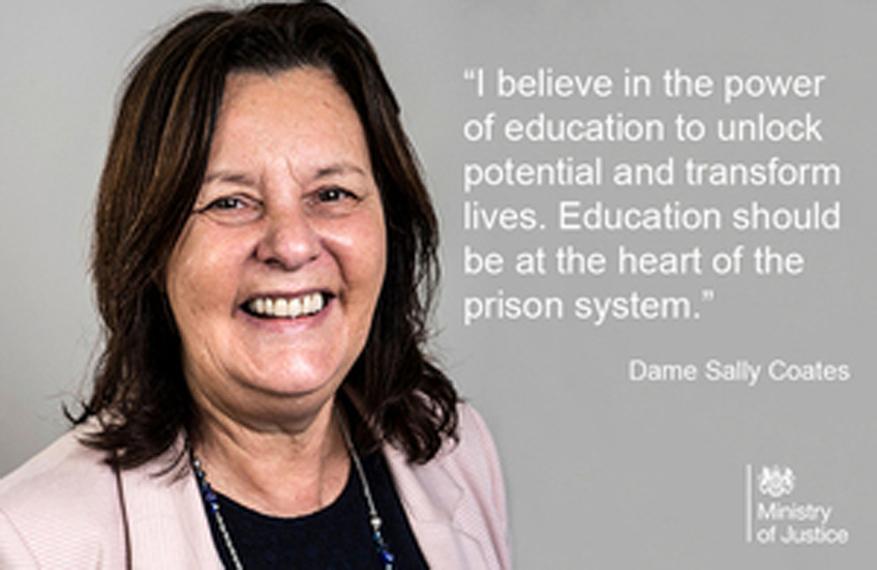Review puts education at heart of prison service

A comprehensive plan to transform the standard of education in prisons has been unveiled today by Dame Sally Coates.
- Governors to be given complete control of the education budget and freedom to tailor the prison curriculum – giving offenders the skills they need to find work on release and close the door on destructive behaviour;
- Every single prisoner to receive a personalised learning plan – improving the life chances of thousands of prisoners and reducing the likelihood they return to crime;
- New fast-track training scheme to attract top-quality graduates to the prison system – helping inspire learners and supporting prisons to deliver high-quality education.
A comprehensive plan to transform the standard of education in prisons across England and Wales and help prisoners get the skills and knowledge they need to turn away from crime has been unveiled today by Dame Sally Coates.
Today’s announcement follows the publication of a wide-ranging and independent review into prison education by Dame Sally – an acclaimed former head teacher with over 30 years’ experience of taking decisive action to improve schools’ performance.
Evidence shows education and employment are critical in reducing reoffending and therefore cutting crime – yet just 1 in 4 prisoners enters employment on release from prison, compared with the current UK employment rate of 74.1 per cent. In addition, just 1 in 6 (16%) leave prison with an education or training placement.
Dame Sally Coates said:
Education should be at the heart of the prison system and I am reassured that so many people share my belief in the power of education to unlock potential and transform lives.
If education is the engine of social mobility, it is also the engineer of prisoner rehabilitation.
Prisoners are in prison because they have done wrong. But once they have served their time, it is just to them and in the interests of their communities that they have the same decent chance to re-enter society successfully, to reject crime, to find work, to live fulfilling lives.
In principle the Ministry of Justice has accepted all Dame Sally’s recommendations. Implementation plans will now be drawn up. The recommendations include:
- giving governors complete control of their education budgets and the freedom to tailor a curriculum according to the needs of their prisoners – ensuring prisoners are provided with the education opportunities and qualifications that will actually help them secure a meaningful and worthwhile job on release;
- creating tailored Personal Learning Plans for each prisoner on their arrival in prison –ensuring each prisoner’s education is prioritised while they are in custody and allowing governors to be held to account for the progress of each offender against their plan;
- giving prison governors greater discretion over prisoner access to ICT and digital technology to facilitate learning – making greater use of technology will significantly improve the quality, quantity and range of education given to prisoners, while keeping important safeguards in place;
- shining a spotlight on poor performance by introducing a new, stand-alone Ofsted judgement on the standard of education in prisons – ending the culture of complacency and taking tough, remedial action against those institutions who fail to immediately improve;
- improving the quality of teaching with a new scheme to attract high-calibre graduates to work in prisons for an initial two-year period – attracting enthusiastic and inspiring professionals to transform prisons into learning environments with education at the heart.
Welcoming the report, the Secretary of State for Justice, Michael Gove, said:
Dame Sally’s superb review makes a compelling case for change. The current standard of education in prisons is not good enough. Quality is patchy, prisoners are not being given the skills and knowledge they need to find jobs and governors are hampered by an overly bureaucratic system.
The review sets out a comprehensive plan. Prison governors will be given control over their education budgets and will have the freedom to change providers. At the same time, we will hold prisons to account for educational outcomes.
Through better prison education and rehabilitation, we will reduce reoffending, cut crime and improve public safety.
At present, 46% of prisoners commit another crime within 12 months’ of release. This high reoffending rate causes misery for victims and costs taxpayers an estimated £13 billion a year.
Improving prison education is one part of the government’s wider prison reform programme. We are investing £1.3 billion in the prison estate, replacing ageing and ineffective prisons with new buildings designed to support rehabilitation.
We are also setting up the first 6 Reform Prisons, with governors handed control over budgets, contracts, the prison regime and engagement with employers and other external organisations.
Read the full report ‘Unlocking potential: a review of education in prison’.











Responses